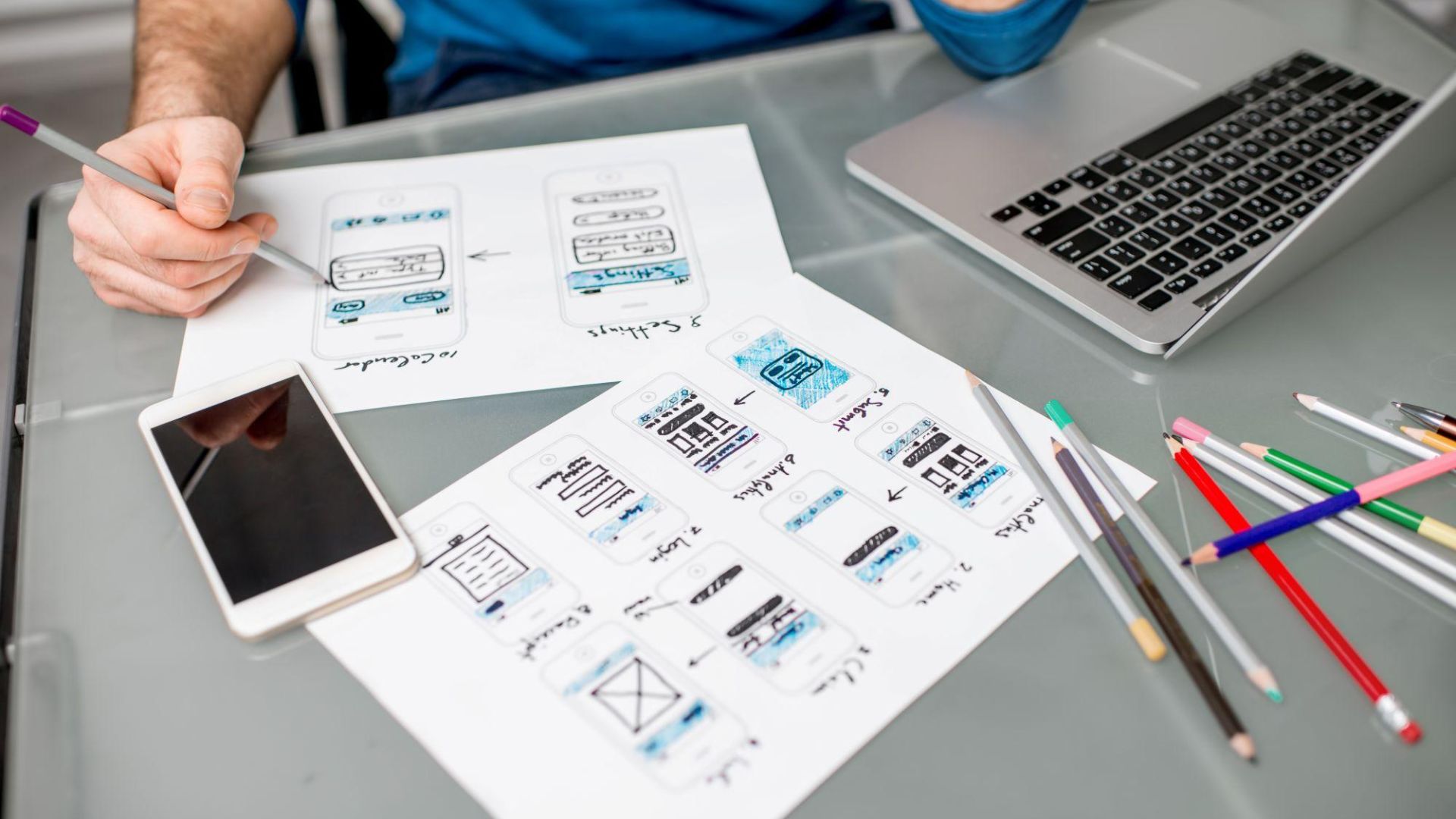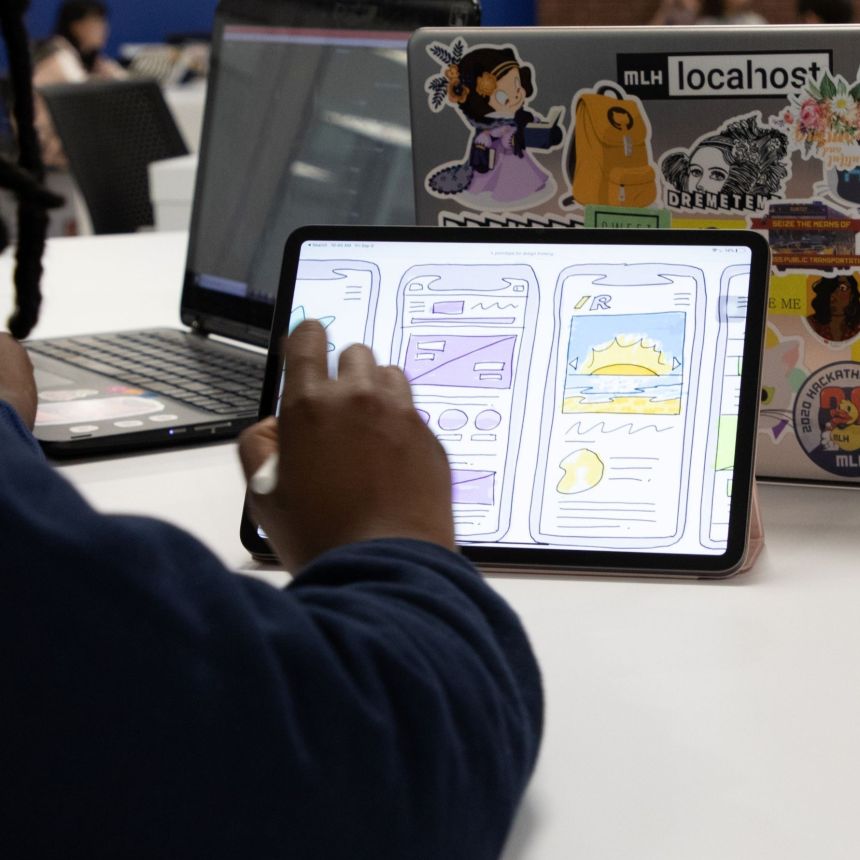
B.S., Human-Centered Design and Development
Technology is only useful if it meets the needs of users.
Creating usable and useful technology requires a deep understanding of who is using it, how, and why. The B.S., Human-Centered Design and Development program positions you to research potential users and understand their needs, experiences, and behaviors so you can create technology solutions that put people first. By leveraging design thinking and user experience principles, you'll ensure that our world of increasingly complex and pervasive technologies can remain aligned with human aspirations, requirements, and limitations.
Is Human-Centered Design and Development Right for Me?
HCDD combines technology with art, design, psychology, and programming, helping you bridge the gap between front-end design and back-end tech. This program could be a great fit if you want to
- design, build and evaluate web, mobile, and other software applications
- research users to understand how people live and how technology fits into their lives
- embrace uncertainty and change on the path to getting things right

What You'll Study
Gain foundational knowledge and state-of-the-art skills needed to develop usable web, mobile, and software applications by exploring topics like these.
- Human-Centered Design for Mobile Computing
- Application Development Studio
- Engineering of Complex Software Systems
- Methods for Studying Users
- Distributed-Object Computing
- Object-Oriented Design and Software Applications
- Programming for the Web
- Design Practice in HCDD
Application Focus Areas
Pick an application focus area or work with an adviser to create your own to gain context for where you will do your work.
- Data Sciences
- Digital Arts and Communication
- Geographic Information Systems
- Healthcare
- Informatics
- Psychology
- Security and Risk
- Sociology
Earn a B.S. and M.S. at the Same Time
You can pursue a B.S. in HCDD and a master's degree at the same time through the Integrated Undergraduate-Graduate (IUG) degree program. IUGs make it possible to complete both an undergraduate and graduate degree in five years!

The Power of Internships
Every HCDD student must complete at least one internship before graduating—most complete more than one, and 84% receive a job offer from an internship provider. With hundreds of organizations recruiting and a dedicated Career Solutions team to support you, you'll have the tools and opportunities to launch your career.
View Past Internships
"HCDD is an incredibly versatile major. I love that I have a variety of focus areas to choose from where I can create a curated path that fits my interests beyond technology.
Kaitlyn Diehl , Class of 2026
Discover Your Career
Technology is ever-changing, and so are the careers that create, use, and study it. As you work toward your degree, you’ll identify and refine your career interests through courses, student organizations, and experiential opportunities. With guidance and resources from our dedicated Career Solutions team—from your first job to the executive suite—you'll gain the technical expertise, business savvy, and communication skills to lead in business, health care, defense, technology, and countless other industries.
Software Engineer
Applies programming languages and engineering principles to design, develop, test, and maintain software applications and systems. Collaborates with cross-functional teams to analyze user needs, create efficient algorithms, and implement scalable solutions.
Application Developer
Designs, builds, and tests apps, collaborating with clients and teams to meet needs, fix bugs, and ensure functional, user-friendly products.
Technology Specialist
Supports diverse business customers by resolving issues, adapting to varying needs, using customer-facing systems, and applying technical knowledge to troubleshoot evolving technologies.
Usability Engineer
Improves user-friendliness of software, hardware, and websites by applying computer science and psychology principles to identify and solve usability issues.
IT Specialist
Specializes in areas like programming, networks, internet, web design, or mobile computing, adapting to new technologies and trends as they emerge in each field.
IT Analyst
Analyzes and transmits specialized information, including acquiring, analyzing, indexing, and preparing abstracts. Manages technical information services, technology assessment, research support, and engineering services.
User Interface/User Experience Designer
Creates the look and feel of features across web and mobile platforms by understanding user needs, translating research into visual designs, and delivering detailed specs for development.
Information Architect
Organizes, structures, and designs information within digital products to ensure usability, accessibility, and effectiveness, creating logical content structures for seamless user navigation and interaction.
Computer Programmer/Analyst
Writes and tests code to ensure applications and software function properly, converting program designs into executable instructions for computers.

User Experience Professional Association
Through mentored research, experiential opportunities, and student organizations like the User Experience Professional Association (UXPA), Human-Centered Design and Development students can extend learning far beyond the classroom. UXPA promotes the value of user experience, research, design and evaluation to students through professional development, education, and networking.
Learn about UXPA

